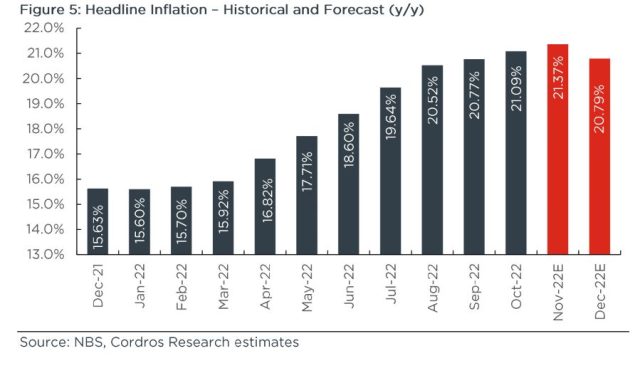WED, 16 NOV, 2022-theGBJournal| The outlook remains pressured however. Food prices is expected to maintain its upward trend in November, given the below average primary harvest season worsened by the high flooding incidence across the country.
Besides, food demand is expected to be high in November owing to the increased consumption associated with year-end festivities, magnifying the food supply-demand gap. In addition, the lingering currency weakness continues to exacerbate food import costs coupled with the high global food prices. Accordingly, Cordros forecasts that food inflation will increase by 15bps to 1,38%.
On the other hand, core basket is predicted to remain pressured over the short-term, albeit lower than the previous month, amid the lingering trifecta impact of sustained elevated diesel and gas prices, currency depreciation, and higher electricity tariffs. Meanwhile, the costs are already being captured in in the prices of commodities.
Moreover, over the short-term, election-related spending could add further pressure to the core index amid increased demand for the local currency. On balance, Cordros projects core inflation to rise by 1.19% m/m/
Overall, m/m inflation is projected now at 1.37% in November and 1.34% in December, translating to y/y readings of 21.37% and 20.70% y/y, respectively.
Meanwhile, consumer prices maintained their uptrend for the ninth consecutive month, according to the National Bureau of Statistics (NBS) latest data, notching higher by 31bps to 21.09% y/y as existing challenges remain intact coupled with the impact of base effects from the prior year.
Decomposing the breakdown provided, we highlight that food prices (+39bps to 23.72% y/y) remain at a 17-year high while the core inflation advanced further by 16bps to 17.76% y/y.
The outturn is 22bps below Cordros’ estimate (21.31% y/y) and 21bps lower than Bloomberg’s median consensus estimate (21.30% y/y). However, on a month-on-month basis, headline inflation moderated by 11bps to 1.24% – tracking lower than the 10M-22 average (1.64% m/m).
Food inflation eased by 21bps to 1.23% m/m in October (September: 1.43% m/m). Notwithstanding, we highlight that the reading is above prior October food inflation readings (12-year average: 0.90% m/m), underscoring the impact of the reported flooding incidents on the primary harvest season.
Indeed, Famine Early Warning Systems Network (FEWSNET) also noted that flooding has led to crop losses, especially in riverine areas and along flood plains. Accordingly, prices of Farm produce snapped the previous month’s downtrend, increasing by 30bps to 1.48% m/m in October. Elsewhere, currency pressures and high global food prices continue to stoke Imported food prices (+4bps to 1.44% m/m) while the Processed food (-35bps to 1.15% m/m) basket eased to its lowest level since November 2021 (1.11% m/m).
However, on a year-on-year basis, food prices rose further by 39bps to 23.72% y/y (September: 23.34% y/y), primarily due to the impact of the unfavourable base effects from the prior year amid the lingering structural challenges impeding food production and supply. Consequently, there was a noticeable increase across the Farm produce (+43bps to 23.77% y/y), Processed food (+38bps to 23.71% y/y), and Imported food (+9bps to 18.09% y/y) sub-baskets.
Elsewhere, the core inflation eased by 66bps to 0.93% m/m, given slower increases in the Transport (-8bps to 1.47% m/m), recreation and culture (-3bps to 1.34% m/m) and Restaurants and hotel (-20bps to 1.28% m/m) sub-baskets. On a year-on-year basis, the core inflation increased by 16bps to 17.76% y/y.
Asides from the low base effect from the prior year, the price pressures synchronised neatly with the (1) intermittent PMS scarcity witnessed during the review period, (2) stubbornly high gas and energy prices, (3) lingering currency pressures, and (4) build-up of higher naira liquidity as the campaign season starts.-With Cordros Research.
Twitter-@theGBJournal| Facebook-The Government and Business Journal|email: gbj@govbusinessjournal.ng|govandbusinessj@gmail.com










